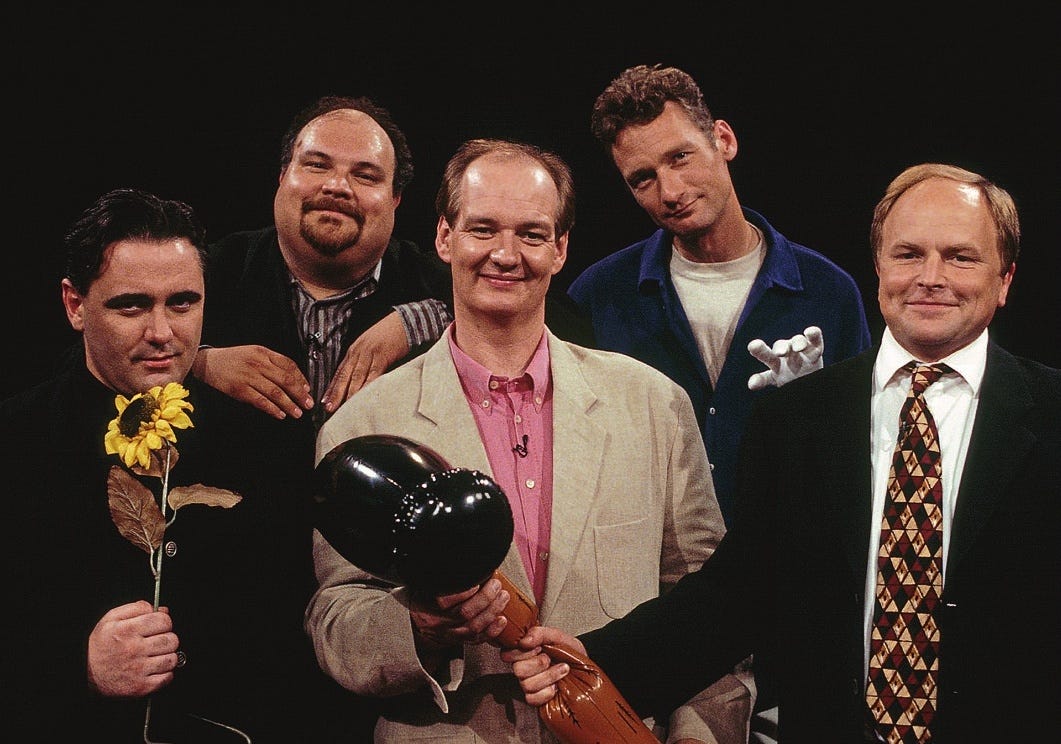Whose line is it anyway?
Friday night TV for a 13 year old Ewan meant three things - Friends (the central perk kind), Don't forget your toothbrush (the anarchic live TV show), and Whose Line Is It Anyway.
For younger readers, WLIIA was a comedy show based upon the art of improvisation. Four incredible performers would be set a challenge by Clive Anderson and would compete for points with a combination of clever word play, made up songs and physical contortion. And Tony Vranch on the piano.
As a kid I was amazed at how fast these people could think, act and interact. They could immediately respond to a line from a colleague that had the audience in stitches with another one that topped it. My heroes at that age were not footballers, boxers or musicians - it was Ryan Stiles and Colin Mochrie (Google them, kids).
One of the games I enjoyed most was called ‘sitting, standing, lying’. The premise being that at any one point, the three performers had to have one of them standing, one sitting, and one lying down. I loved the way they would try and stitch each other up both verbally and physically.
I never got into improv personally. I think that when not done at the standard of the legends in the picture above it can be excruciating and self indulgent. Anyone who's ever been to the Edinburgh festival will know what I mean…..
But now, at the ripe old age of 45, I find myself in my own version. NHS ‘reform’: a play without a script. A headline without an outline. A movie without a final scene.
So we're making it up as we go along. That's an opportunity. Ryan Stiles loved being able to be given a broad subject, some ground rules, maybe a musical accompaniment, and being allowed to get on with creating his own laughs.
For those of us affected by NHS reform it feels the same. But with more at stake. So how do we take this challenge? I think there are a few lessons we can learn:
‘Yes, and’. The "Yes, and" rule in improv is a fundamental principle where an improviser accepts what another has introduced ("Yes") and then adds to it ("And"). There's no point arguing about the rules that have been set, the principles laid down, or the direction given. It's too late for that. Take the situation and make it work.
Sit, stand, lie. There are times we will feel energised, enthused and excited. We'll want to stand at the front of the stage and have our voices heard. And there will be times we are exhausted, bruised, anxious, fearful or angry, and we'll need to lie down. Sitting is the key in this rather tortured analogy: know when those around you need to be either standing and being heard, or lying down and recovering. When that happens, take a seat. Pass the mic.
Stay present. Focus on the current moment and adapt to what’s happening now. Don't worry about the past, we've all moved on. And the future hasn't been written yet.
Avoid blocking. Don’t dismiss concerns or new suggestions outright; instead, explore how they might fit the evolving situation
Trust those around you. It's not an individual sport. When you get a creative block or run out of energy, people around you will pick up the baton.
In the end, thriving through change is less about having the right answers and more about having the right mindset. If the cast of "Whose Line" can turn chaos into comedy, maybe we can turn uncertainty into opportunity. What scene will you help create next?




